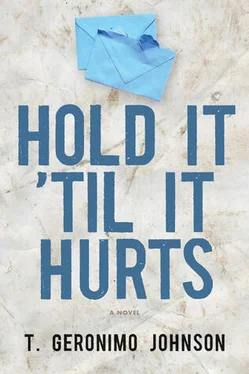St. Augustine was a white two-story church with a brick belfry capped in copper. The church capstone read 1834. The chancellery was behind the church, and in the courtyard between the two buildings sat a large anchor made of welded chains, dedicated, according to the plaque, to the Unknown Slave. Achilles stopped only briefly to examine it, anxious to get out of the heat and into the chancellery. The office was crowded with folding chairs and tables along one wall, and along the other sat a row of desks with handwritten name tents, according to which the desk closest to the door belonged to Levreau, a gaunt-faced man who, even when seated, appeared to be quite tall. He was on the phone but greeted Achilles with a smile, covering the mouthpiece with his hand and motioning for Achilles to sit while whispering, “Good afternoon, be right with you.”
Achilles remained standing, reluctant to move because he was directly under the air-conditioner vent. Over the rush of air he heard gospel music. The office had two bookshelves, one lined with different books, the other stacked with identical copies of the same Bible; a sign on the office door read “Breaking the Twin Shackles of Sin and Oppression”; African prints lined the walls. Did Merriweather’s church look like this? Achilles struggled not to laugh at a life-sized painting of Jesus with an Afro and a Village People beard, a Harlem Globetrotter in a bathrobe. A woman at the far desk typed on a computer, nodding her head to the music. An older woman stuffed envelopes. Levreau placed the handset carefully in the cradle, like it was fragile when it was only an old plastic dumbbell-shaped receiver. He seemed to be a man who focused intently on everything he did. “Yes sir. How may I help you?”
“I’m looking for my brother, Troy Conroy. He was here two days ago.” Achilles handed him the most recent photo of Troy, taken a few days before the funeral at the hospital with Merriweather.
Levreau shook his head, then went around the room and showed the photo to everybody. Achilles held his breath at each exchange. Levreau returned to his desk looking disappointed. “Sorry. And I make a point to meet all the new parishioners. Is he new? How long has he been attending?”
“I don’t think he’s attending. He was here on Wednesday.”
“Oh,” Levreau gave him a knowing look. “We only feed people once a week, on Wednesdays. Have you tried the shelters?”
“No.”
While Levreau rattled off a few names, Achilles pictured parks with gazebos, until the meaning of shelters sunk in. “It’s not like that. He’s looking for someone else who might be around here.” Achilles stopped short. “He’s not homeless. He’s looking for somebody who might be homeless, but he’s not homeless.”
“Yes sir. Okay. I’ll tell you what. I’ll copy this, and put it on our bulletin board in the vestibule. Right up front. Everyone will see it when they come in. If he’s been here, someone’s seen him.” Levreau vanished into a back room and returned a moment later with a hazy enlargement. Achilles wrote his number on the bottom of the copy.
“Do you know his name?” asked Levreau.
“Troy Conroy.”
“I meant the person Troy’s looking for.”
“No.” It felt funny to hear Levreau say Troy in that baritone.
“Well, try looking at St. Jude.”
“Where’s that?”
“Where is St. Jude again?” Levreau asked over his shoulder. No one knew. “It’s brand new and might not be open yet. But it’s supposed to be the biggest shelter in the city. Have you filed a missing person report?”
“No.” Achilles was put off by the suggestion. Even trying a shelter seemed a waste of time. If St. Augustine didn’t serve food every day, he’d just come back the following Wednesday. Troy wouldn’t be staying at a shelter.
“Try filing a missing person report.”
“I don’t know the name of the people, or person, he’s looking for.” He’d have to ask his mom about that, again.
“I meant for your brother. That way, if he gets a traffic ticket, for example, praise Jesus, you found him. Car accident, praise Jesus, you found him. There’s a substation nearby. I’ll draw you a map.”
Levreau sketched out a map and wished him luck. Achilles thought he could go to the police station and file that report, just in case. But it would be more helpful if he knew who Troy was looking for before he did. It was the time she’d usually be taking a nap, but he called his mother anyway, halfway hoping she wouldn’t answer. To his surprise, she did, and hearing his voice asked, “Already?”
“Maybe not for a week,” said Achilles.
“Where is he?”
“I’m not sure.”
“Then how do you know he’s gone for a week?” she asked.
Her question ticked the hairs on the back of his neck. It had been her idea to hand out envelopes. “It looks like the people he’s looking for might be gone for a week.”
She exhaled sharply. “At least we know he’s okay. That’s good enough. If you want to come back you can, or go somewhere else. I just mean you don’t have to stay down in New Orleans all week waiting for Troy.”
He could tell she was straining to sound upbeat. “It’s okay. I don’t mind. It’s a chance to see Wages.”
She was always more talkative on the phone, and for a few minutes droned on about seeing Janice at the store, and what the neighbors were doing (those she did talk to), and why Maryland had better highways than Pennsylvania. He heard her shifting and moving between breaths. Even after they’d been on the phone a few minutes, she was still breathing heavily, which worried him until he remembered the backpack. In the middle of telling him about a new pothole in town, she paused and said, “You’re a good son, and a better brother.”
She’d never said anything like that before, and Achilles didn’t know how to respond. He mumbled his thanks and ended the call before he remembered to ask her the name of Troy’s family. He was so taken aback by the compliment that he didn’t want to call her back.
The police station was a converted gas station wedged between the Bluebird Diner and a liquor store. The offices were where the auto bays used to be, the front desk where the cashier would have sat. The remodelers had saved the night-service window, a little Plexiglas revolving door in the wall behind the front counter, and now a small TV was wedged into it, holding the attention of a heavyset officer. Achilles stood at the counter, his hands behind his back in parade rest, and waited to be acknowledged. The cop held up a finger until a laugh track died down, then finally looked up at him. “Help you?”
“Yes sir. Where do I file a missing person’s report?” asked Achilles.
“Here. You got a name and address?” asked the officer, pushing a form at him.
“Yes sir. But, he doesn’t live here.”
“Does he have a local address?”
“No sir. All I know is he was last seen here.”
“You could try posting flyers, unless he’s the type that doesn’t want to be found.” Hearing a laugh track, the cop glanced back at the television. “Where was he last seen?”
“St. Augustine.”
“In the Tremé? The Tremé. Huh!” His tone became weary and officious, as if he had explained this to Achilles one thousand times. “You file the report in the city where the person lives.” He turned the TV up.
Achilles had known it was a stupid idea, one of those plans desperately followed just to keep busy, even though it was clearly pointless. What if he has a car accident, praise Jesus, or gets a speeding ticket, praise Jesus! Achilles wanted to yell as he left the station.
“Hey,” said the desk sergeant. He wrote a number on the back of a card, tapping it twice. Leaning forward, he whispered sympathetically, as if sharing a secret, “Try the coroner.” He motioned to the phone at the end of the counter. “You can use this one here. Go on. Guy sounds like he could be half the poor saps in there. It’s worth a shot. In the cooler no one can lie about his name.”
Читать дальше












